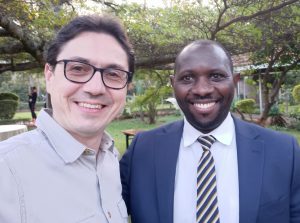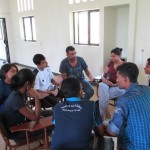In the Armenian student movement (CICI), they felt the challenge to have good Bible study materials to put in the hands of their students. While there were some materials available, they needed to be translated and interpreted properly to maintain their relevance in that context. So, we decided to invest time in staff, to enable them to feel confident to create their own Scripture Engagement materials, and then do the same with student leaders.
We wanted to take the Armenian context seriously, be faithful to the message of the Bible – both in specific passages and for the whole story of Scripture. We talked about how their students learn, what creative approaches to use during Bible study (for observation, interpretation, application and response), and how we can encourage students to love and value the Word of God.
 Anna L, General Secretary CICI:
Anna L, General Secretary CICI:
“This training has taught us to lead both practically and relationally. We have been challenged to be critical thinkers, to consider the historical and cultural context, and to passionately observe the text as we seek to know and love the Word of God and the God of the Word.”
One such approach was ‘Participative Drama/TV Interview’, which enables deep observation of a text and stimulates the imagination. I’ve seen and experienced this numerous ways in recent years, usually with a New Testament narrative.
This time we studied Nehemiah 8 and the wonderful story of how the people came to Ezra, asked for the Word to be read to them and responded from their hearts with weeping, joy, and obedience.
First, we read the passage aloud, then discussed the context of the story and any resulting questions. Each participant was assigned a character: Ezra, two regular Israelites, and two Levites (with more participants, Nehemiah, and some elders being added if necessary).
Next steps:
1. Read the passage again as that person (or group, e.g. Levites)
2. Remember how you as that person/group ended up here (context of exile and return, books of Ezra and Nehemiah)
– What do you already know or have you experienced of God? (Where is this event in the whole story of salvation?) What questions might you therefore have in life?
3. How do you as Ezra, for example, feel on this day?
– What are your fears/hopes/questions before, during, and after these events?
4. ‘TV interview’ that addresses questions to each person/group, with a final question to everyone that considers the significance of what they heard and experienced. For example:
– How have you been changed by the events of these days?
– How will you talk about this day with your future grandchildren, what advice will you give them as a result?
– How is it possible to keep living by the Word as families and as a community?
5. Debrief the exercise together
6. Discuss its application today
7. Prayer
Some of the staff enjoyed this so much that they started to recognise how it could be used straight away.
Paula
IFES Associate Secretary for Scripture Engagement






